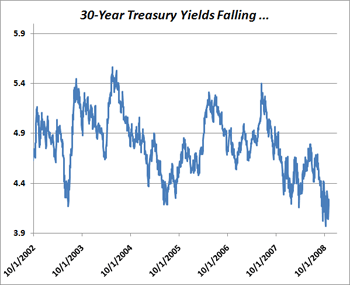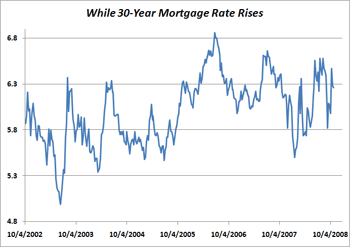Interest Rate Conundrum Heralds More Stock Market Distress
Interest-Rates / Stocks Bear Market Oct 31, 2008 - 12:36 PM GMT Mike Larson writes: Step into my interest rate time machine for a minute, if you will. We're going back to February 16, 2005 — the day former Federal Reserve Chairman Alan Greenspan testified before the Senate Banking Committee.
Mike Larson writes: Step into my interest rate time machine for a minute, if you will. We're going back to February 16, 2005 — the day former Federal Reserve Chairman Alan Greenspan testified before the Senate Banking Committee.
The topic of the day was the broader economy.
But the biggest issue addressed, from the bond market's perspective, was the infamous interest rate “conundrum.” The term referred to the odd reluctance of long-term interest rates to rise, despite the Fed's steady and persistent campaign of short-term interest rate hikes.
Or as Greenspan explained at the time …
 |
| Today, the government wishes it only had the problem former Chairman Greenspan faced on February 16, 2005. |
“Long-term interest rates have trended lower in recent months even as the Federal Reserve has raised the level of the target federal funds rate by 150 basis points. This development contrasts with most experience, which suggests that, other things being equal, increasing short-term interest rates are normally accompanied by a rise in longer-term yields …
“For the moment, the broadly unanticipated behavior of world bond markets remains a conundrum .”
Boy would the government like to have THAT problem again!
Today, we face a different — and far more dangerous — conundrum: Despite plunging short-term rates … despite falling rates on U.S. Treasuries … mortgage rates are NOT falling. In fact, the past few months, they've been going UP.
Two roads diverged in a bond market world: Treasuries and mortgages decouple …
 |
 |
Take a look at these two charts. One shows the yield on the 30-year U.S. Treasury Bond. The other shows the average rate on a 30-year fixed mortgage, courtesy of the Mortgage Bankers Association. I have shown roughly six years of history for both.
You can see that for the early part of the 2000s, the patterns look very similar. When long-term Treasury bond yields fell, so did long-term mortgage rates. When long-term Treasury rates went up, so did the cost of borrowing to buy a home or refinance a fixed mortgage.
But look more closely at what has happened in the past year, and you'll see something entirely different …
Treasury rates have plunged — with the 30-year bond recently yielding as little as 3.97% in early October. That undercut the “deflation scare” low of June 2003 (4.17%). In fact, it's the lowest yield in the history of the 30-year bond!
Yet 30-year mortgage rates have gone sideways to up. From a recent low of 5.5% in January, they have climbed to 6.26% as of late October. That is nowhere near the deflation scare low of 4.99%.
- This is happening DESPITE the government's takeover of Fannie Mae and Freddie Mac.
- This is happening DESPITE the Treasury Department's pledge to buy Mortgage Backed Securities in an attempt to artificially suppress mortgage rates.
- And this is happening DESPITE a whopping 425 basis points — or 4.25 percentage points — in Fed rate cuts.
A conundrum? You bet! And not a beneficial one, either.
The lesson?
No one — not even the government — is more powerful than the market …
For more than a year now, we have been bombarded with government bailout packages.
We have seen interest rate cut after interest rate cut.
Our elected officials (and the unelected policymakers at the Fed) have seen fit to spend hundreds of billions of dollars in taxpayer money — our money — to save Fannie Mae, Freddie Mac, AIG, and Bear Stearns.
They are handing out $250 billion to everyone from Citigroup to SunTrust, even helping banks merge in transactions partially funded with our money.
And yet, by this one crucial gauge — the cost of a 30-year fixed mortgage — the government and the Fed have failed to achieve much of anything. The lesson is simple: No one … not even the government … is more powerful than the market.
 |
| Bond traders throughout the world are worried about the quality of U.S. borrowers. |
Worse yet, fear is spreading throughout the world …
Market players — mortgage bond buyers — are worried about the direction of house prices. They're concerned about the credit quality of U.S. borrowers. This is filtering into the price of mortgage bonds, and keeping yields elevated.
Foreign investors, who used to snap up every last mortgage backed security and corporate debt security sold by Fannie Mae and Freddie Mac, appear to be backing away somewhat.
Concerns about the precise nature of the government's support of Fannie and Freddie are also driving the two agencies' borrowing costs up. That, in turn, puts upward pressure on mortgage rates.
Another reason for higher rates overall: Concern about the long-term fiscal position of the U.S. The government has committed more than $1 trillion to all of its various bailouts — and the list of companies begging for taxpayer money gets longer every day.
Insurers want the same kinds of government-funded capital injections that banks are getting. GM and Chrysler want government money to help them merge, close factories, and fire thousands of workers. Home builders want fresh tax credits to spur purchases.
You'd think at some point that officials in Washington and investors on Wall Street would get it. You'd think that they'd understand the only solutions to the credit mess, the deleveraging, and the real estate bust are simple: Time and price. You simply can't cure the popping of a multi-year debt and housing bubble by waving a magic wand — not even a $1 trillion one.
For stock investors, my prescription remains the same: When you get government-fueled, short-term rallies, you should look at them as opportunities to SELL. Or if you're more aggressive, use them to add inverse ETFs or put options on the cheap before the next leg down.
At some point — once the unwinding is complete, once the recession has run its course, and so on — THEN I think you can start to bargain-hunt and bottom fish. But now is not that time, in my opinion. The conundrum is still very much with us.
Until next time,
Mike
This investment news is brought to you by Money and Markets . Money and Markets is a free daily investment newsletter from Martin D. Weiss and Weiss Research analysts offering the latest investing news and financial insights for the stock market, including tips and advice on investing in gold, energy and oil. Dr. Weiss is a leader in the fields of investing, interest rates, financial safety and economic forecasting. To view archives or subscribe, visit http://www.moneyandmarkets.com .
Money and Markets Archive |
© 2005-2022 http://www.MarketOracle.co.uk - The Market Oracle is a FREE Daily Financial Markets Analysis & Forecasting online publication.



